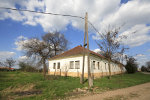Money and Banking in Hungary
Robert Kemkers, Monday, 12 September 2016

Author: Robert Kemkers,
Translated by Jos Deuling,
Roberts Advice on Money and Banking in Hungary
We regularly get questions about changing money, withdrawing money and opening a bank account in Hungary. Therefore, this time, we focus on those themes, with tips for both tourists and permanent residents.
The national currency of Hungary remains the forint. The introduction of the euro has repeatedly been delayed in Hungary, and although the goal is to become part of the euro area in the future, it seems that the next five years the forint (abbreviated as Ft. Or HUF) will be used as currency. In some stores and gas stations you can also pay with euros, but often at an unfavorable rate.
The forint
Previously, the forint was subdivided into "filler", which was abolished a long time ago, as well as the coins of 1 and 2 Forint. Today there are coins of 5, 10, 20, 50, 100 and 200 forint and bills of 500, 1,000, 2,000, 5,000, 10,000 and 20,000 forints. The last two have recently been renewed, with slightly different colors and more safety features. The plan is also to renew the ticket of 5,000 forints at the end of this year. From January 1, 2017, you can’t pay anymore with the older series of 20,000 Ft. (The new version is green)! One can still exchange these notes at banks and post offices.
Withdrawing money
The exchange rate fluctuates for some time around HUF 310 for € 1 (actual middle rate can be found at www.mnb.hu). The most advantageous way to get forints is to withdraw money with your UK bank card at an ATM. 'ATM' designated machines are found in every larger village. Also, for a small fee, one can often withdraw money in a post office with a foreign bank card. Up to € 500 per day, which is about 150 000 Ft (100 000 Ft at the OTF Bank). There is often a maximum per week (which runs from Thursday). Note! More and more machines ask after selecting the amount if one wants to write off the money without conversion (HUF) or conversion (in EUR). In this case, choose the option 'without'! Then the bank in your home country exchanges the money at a favorable rate. Conversion to HUF will result in an unfavorable exchange rate! Also, withdrawing money with a credit card is much more expensive and only handy for emergencies.
Exchange
Don’t exchange hard cash at a Hungarian bank; the exchange rate is rather poor, and one has to pay a commission. Currency exchange on the street (black market) is only recommended if one wants to experience how a Hungarian police station looks from the inside and if one wants to be ripped off! A much better alternative are the many exchange offices (pénzváltó). They use transparent market rates, though these rates may differ. Beware of fraud in tourist locations such as Budapest and Siófok! Often there is an exchange office in the building of TESCO, but that does not always give the best price. In Pécs the Kórház tér in Irgalmasok utcája (Mišo) exchange at good rates; in large amounts, one usually gets a slightly better rate. Be aware that exchange offices charge a commission!
Bank Tax
Often banks calculate a fee in the form of a 'financial transaction tax.' The tax is introduced for the banking sector to combat the economic crisis. The idea is that the financial sector - which is held responsible for the crisis - has to make their contribution, but banks charge this on to the customer. This "bank tax" applies to virtually all transactions: money exchange, cash or cash via the ATM, money transfer (also via the Internet). Hence withdrawing money and money transfer in Hungary is not free. The tax amounts to 0.3-0.6% depending on the transaction type. Also, the bank adds another percentage (up to a maximum for larger quantities). The rates differ significantly between banks and between different kinds of bank accounts (packages).
Which package?
In one lives (semi-) permanent in Hungary ask your bank for advice. With some types of bank accounts, one has to pay a slightly higher fixed monthly cost but lower transaction costs. It is also possible to have a bank account where one can withdraw with no costs money at any ATM in Hungary for a maximum of twice per month and with a maximum total of 150,000 Ft.
Transfer in forints
Usually, anyone who has a business account pays a higher amount of costs and also pay when cash is deposited, or money is credited to the account. The latter does not apply to most private accounts, though these are charged if euros are transferred from abroad on an HUF account. These costs can be circumvented by transferring an amount in forints from abroad or by opening a euro account at the Hungarian bank. Usually transferring euros to a euro account costs nothing and many banks offer to exchange digital money over the internet at a favorable exchange rate between a euro and a forint account. The higher the amount, the better.
Withdrawing euros
One can not withdraw euros from an ATM, but only via a bank. Larger amounts one needs to apply for 1-2 days in advance. Large amounts of forints are no problem, but the cost is slightly higher than when withdrawing from an ATM. In the latter case, the limit is usually 200,000 to 400,000 forint /day.
Recommended banks
From our experience I can particularly recommend the Raiffeisen Bank and Erste Bank: the qualified staff usually speaks English or German and have favorable tariffs for transfers and withdrawals. However, smaller subsidiaries of Raiffeisen Bank are recently closed, but you can still visit the provincial capitals. Other banks with a good reputation are K & H Bank, Budapest Bank. The advantage of the Takarék Bank (independent regional savings banks with different names like Hungária, Szigetvári, Mohacsi Takarék etc.) is that they have many branches, even in smaller towns. A disadvantage is that one does not speak foreign languages everywhere. From my experience I do not recommend the OTP Bank; usually much bureaucracy, lack of language skills and high (er) rates.
Other banking issues
All banks offer payment of (utility) bills by direct debit (csoportos Beszedes). Opening a savings account is possible, but the interest rates are very low, and there is still a 22% tax rate on the interest. There is no wealth tax; Hungary has no bank secrecy and savings are now also fast (er) known to the tax authorities in other EU countries. Money is rather safe in a Hungarian bank, guaranteed to € 100,000. More savings can best be spread over several banks. Some bank branches offer the possibility of renting a safety deposit box (Szef).

Author: Robert Kemkers,
Translated by Jos Deuling,
Roberts Advice on Money and Banking in Hungary
We regularly get questions about changing money, withdrawing money and opening a bank account in Hungary. Therefore, this time, we focus on those themes, with tips for both tourists and permanent residents.
The national currency of Hungary remains the forint. The introduction of the euro has repeatedly been delayed in Hungary, and although the goal is to become part of the euro area in the future, it seems that the next five years the forint (abbreviated as Ft. Or HUF) will be used as currency. In some stores and gas stations you can also pay with euros, but often at an unfavorable rate.
The forint
Previously, the forint was subdivided into "filler", which was abolished a long time ago, as well as the coins of 1 and 2 Forint. Today there are coins of 5, 10, 20, 50, 100 and 200 forint and bills of 500, 1,000, 2,000, 5,000, 10,000 and 20,000 forints. The last two have recently been renewed, with slightly different colors and more safety features. The plan is also to renew the ticket of 5,000 forints at the end of this year. From January 1, 2017, you can’t pay anymore with the older series of 20,000 Ft. (The new version is green)! One can still exchange these notes at banks and post offices.
Withdrawing money
The exchange rate fluctuates for some time around HUF 310 for € 1 (actual middle rate can be found at www.mnb.hu). The most advantageous way to get forints is to withdraw money with your UK bank card at an ATM. 'ATM' designated machines are found in every larger village. Also, for a small fee, one can often withdraw money in a post office with a foreign bank card. Up to € 500 per day, which is about 150 000 Ft (100 000 Ft at the OTF Bank). There is often a maximum per week (which runs from Thursday). Note! More and more machines ask after selecting the amount if one wants to write off the money without conversion (HUF) or conversion (in EUR). In this case, choose the option 'without'! Then the bank in your home country exchanges the money at a favorable rate. Conversion to HUF will result in an unfavorable exchange rate! Also, withdrawing money with a credit card is much more expensive and only handy for emergencies.
Exchange
Don’t exchange hard cash at a Hungarian bank; the exchange rate is rather poor, and one has to pay a commission. Currency exchange on the street (black market) is only recommended if one wants to experience how a Hungarian police station looks from the inside and if one wants to be ripped off! A much better alternative are the many exchange offices (pénzváltó). They use transparent market rates, though these rates may differ. Beware of fraud in tourist locations such as Budapest and Siófok! Often there is an exchange office in the building of TESCO, but that does not always give the best price. In Pécs the Kórház tér in Irgalmasok utcája (Mišo) exchange at good rates; in large amounts, one usually gets a slightly better rate. Be aware that exchange offices charge a commission!
Bank Tax
Often banks calculate a fee in the form of a 'financial transaction tax.' The tax is introduced for the banking sector to combat the economic crisis. The idea is that the financial sector - which is held responsible for the crisis - has to make their contribution, but banks charge this on to the customer. This "bank tax" applies to virtually all transactions: money exchange, cash or cash via the ATM, money transfer (also via the Internet). Hence withdrawing money and money transfer in Hungary is not free. The tax amounts to 0.3-0.6% depending on the transaction type. Also, the bank adds another percentage (up to a maximum for larger quantities). The rates differ significantly between banks and between different kinds of bank accounts (packages).
Which package?
In one lives (semi-) permanent in Hungary ask your bank for advice. With some types of bank accounts, one has to pay a slightly higher fixed monthly cost but lower transaction costs. It is also possible to have a bank account where one can withdraw with no costs money at any ATM in Hungary for a maximum of twice per month and with a maximum total of 150,000 Ft.
Transfer in forints
Usually, anyone who has a business account pays a higher amount of costs and also pay when cash is deposited, or money is credited to the account. The latter does not apply to most private accounts, though these are charged if euros are transferred from abroad on an HUF account. These costs can be circumvented by transferring an amount in forints from abroad or by opening a euro account at the Hungarian bank. Usually transferring euros to a euro account costs nothing and many banks offer to exchange digital money over the internet at a favorable exchange rate between a euro and a forint account. The higher the amount, the better.
Withdrawing euros
One can not withdraw euros from an ATM, but only via a bank. Larger amounts one needs to apply for 1-2 days in advance. Large amounts of forints are no problem, but the cost is slightly higher than when withdrawing from an ATM. In the latter case, the limit is usually 200,000 to 400,000 forint /day.
Recommended banks
From our experience I can particularly recommend the Raiffeisen Bank and Erste Bank: the qualified staff usually speaks English or German and have favorable tariffs for transfers and withdrawals. However, smaller subsidiaries of Raiffeisen Bank are recently closed, but you can still visit the provincial capitals. Other banks with a good reputation are K & H Bank, Budapest Bank. The advantage of the Takarék Bank (independent regional savings banks with different names like Hungária, Szigetvári, Mohacsi Takarék etc.) is that they have many branches, even in smaller towns. A disadvantage is that one does not speak foreign languages everywhere. From my experience I do not recommend the OTP Bank; usually much bureaucracy, lack of language skills and high (er) rates.
Other banking issues
All banks offer payment of (utility) bills by direct debit (csoportos Beszedes). Opening a savings account is possible, but the interest rates are very low, and there is still a 22% tax rate on the interest. There is no wealth tax; Hungary has no bank secrecy and savings are now also fast (er) known to the tax authorities in other EU countries. Money is rather safe in a Hungarian bank, guaranteed to € 100,000. More savings can best be spread over several banks. Some bank branches offer the possibility of renting a safety deposit box (Szef).

Second homes, renovation objects and holiday homes for sale in Hungary. For sale by owner and agents. Properties at Lake Balaton, in Pecs and many other regions.
 Financing a property deal in Hungary can be solved by a mortgage loan granted by a Hungarian mortgage bank, but foreigners should keep in mind that
despite the low interest rates, the full amount that they will have to pay back is only shown in the Total Credit Fees Index (THM). Another useful tip
is to apply for a mortgage loan as an individual rather than a company.
Financing a property deal in Hungary can be solved by a mortgage loan granted by a Hungarian mortgage bank, but foreigners should keep in mind that
despite the low interest rates, the full amount that they will have to pay back is only shown in the Total Credit Fees Index (THM). Another useful tip
is to apply for a mortgage loan as an individual rather than a company.
More articles
